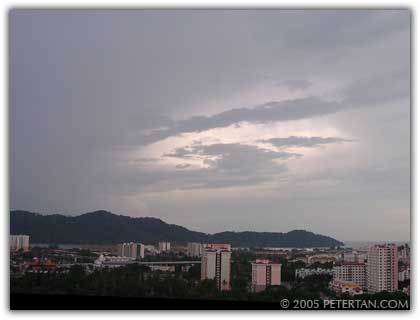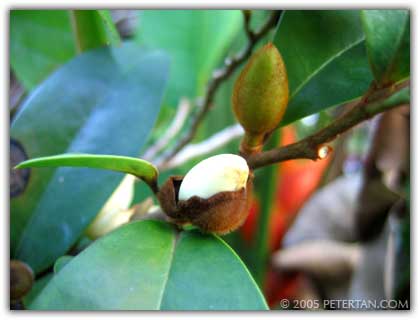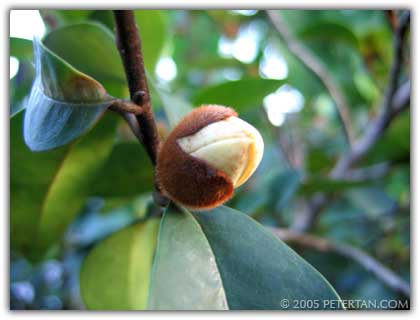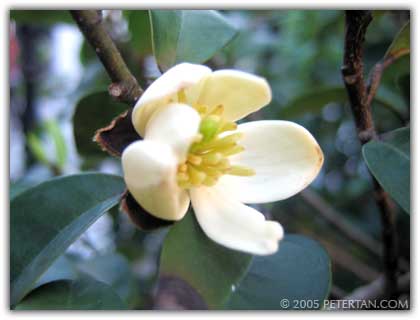
Every bend, every tree, every bridge on that road had been embedded in my tender mind. Dad and Mum had taken me on this windy country road many times. I was about five or six. My memories of those times were mostly of whitewashed milestones, inanimate objects, towering durian trees and bamboo clumps rather than of people. The greenery was refreshing. Streams gurgled and birds chirped. I loved it, except for the motion sickness. The windy road made me nauseous.
That evening was different. Mum spoke in a hushed voice. I have never seen her looked that anxious before. Her eyes, they reflected sadness. The road looked different in the dark. Smell, I remembered the smell, of the PVC car seat. I was edgy. It irritated my nostrils. I was getting ill. The only illumination came from the car headlights. Occasionally the flickering glows of fireflies broke the monotony of the dark sheet of black that enveloped everything, everything.
The trees seemed unfriendly, vicious. They rose up like enormous monsters that threatened to swallow us with a single gulp should we stray from the road. All was silent except for the constant whirring of the engine and the incessant eerie screeching of the cicadas. It was all silent. Mum did not say a word. I wondered why, why we were making that journey in the middle of the night. She could have waited till Dad came back from work.
The hike down to the house was a harrowing one. Rocks that were stacked into steps were sometimes loose. I do not remember if I was carried or climbed down by myself. I do not even remember the fifteen minutes journey down. Did Mum cry? I cannot recall. Maybe she did. Did I see the body? I truly cannot remember. But I remember the casket, the edges, the colour, the trimmings. The corners, those sharp corners of the casket, they kept popping up in my mind.
I remember running around the casket in a game of catch. There were flowers. I had to wear black. They were sewn on the spot. The sewing machine never stopped churning out shirts and pants and shorts. I hated how it smelt, how I sweated and how the sweat made the clothes smell worse. It was stiff and tore easily. My cousins all had to wear black too. I was punished by Mum. My cousins complained to her that I threw stones at them. I do not remember the pain but I remember the rotan, thin and supple, and Mum wielding it threateningly at me.
The hearse was a big vehicle. Did I accompany the casket in it? I am not very sure. Maybe I did. We passed Titi Kerawang. We passed the Sungai Pinang town. We passed paddy fields, stilted kampong houses, orchards. These are all a blur as we raced to the church. There was Mass. I did not understand what the priest said. It was taking too long. I shifted uneasily on the hard bench.
At the cemetery, slabs and slabs of granite, polished, stood erect in rows. Some had small portraits. They looked old. At the front row, freshly dug red earth piled up high by the edge of a hole. The casket was put in. It was deep. There were tears, some sniffles too. I did not cry. I did not even feel anything. It was just another unusual adventure. Throwing stones at the other kids was fun. Maybe I will do that again when Mum is not watching.
Those are very scant recollections of the first death that I ever experienced. The emotions of the moment were lost on me. I was too young to understand. What is death? What is life? I hardly knew him, save for the few days that he came to stay with us. As I think back, I mourn for the fact that I did not get the opportunity to know him better. I would really love to be pampered by him, to be patted on the head, to sit on his lap, or just sit beside him and inhale the fragrant aroma of his pipe tobacco.
Pipe, I have that, passed down to me from Mum. The pipe that he had used is one that I will fondly remember him by together with a portrait that was probably enlarged and used for his funeral. A careful scrutiny revealed engravings on both sides of the pipe. On the left is “Invicta Finest Briar” and the right “Allegro Hand Made.” Those are the only precious possesions I have that are his.
He was a war hero too. He helped some British soldiers evade capture by the Japanese during World War Two. He was given a certificate of appreciation. It is a cloth scroll framed and displayed proudly in the house that has become my uncle’s now. That is all I can remember of my Ah Kong, my maternal grandfather. May his soul rest in eternal peace.




